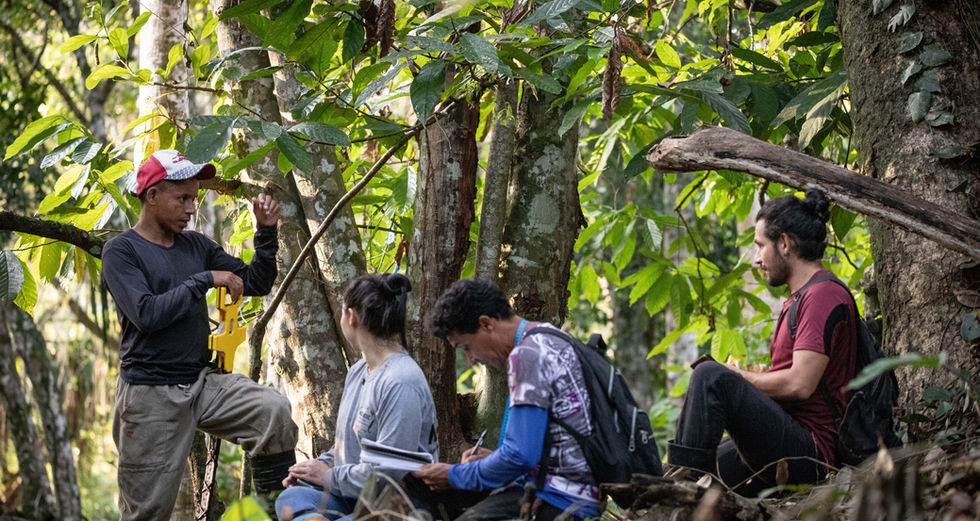

The Ecological Assessment Initiative aims to understand the long term biodiversity and socioeconomic impacts of agricultural land use change on nature and humans.
The Mata Atlântica, a hotspot of biodiversity, is an example of forest loss occurring at rapid rates in the past years associated to expansion of cash crops and livestock. Ecosystem degradation of the Mata Atlântica shows strong negative impacts on forest conservation efforts of their unique biodiversity, and on the livelihood opportunities for smallholders. In this region, cocoa, has been traditionally growing in agroforestry systems, known as cabrucas, under the shade of Mata Atlântica remnants. However, environmental and socioeconomic pressures are shifting traditional agroforestry systems towards full sun cocoa monocultures, or other intensified land uses, causing landscape simplification, biodiversity loss, and lack of resilience to mitigate climate change impacts.
Land use changes in cocoa dominated landscapes of Brazilian Atlantic forest have strong negative effects on biodiversity conservation, ecosystem functions, and climate change mitigation. There is evidence pointing out that landscape simplification of Atlantic forest decreases biodiversity of tree plants, reptiles and amphibians, birds and bats, and arthropods. Also, this shift affects climate change mitigation, as carbon sequestration potential is also reduced with intensified landscapes. Historical evidence in Southern Brazil, shows disruption of ecological functions reduces farm capacity to tackle pest outbreaks jeopardizing local and regional socio-economic stability.
The EAI-Project is a scientific cooperation project between the SASE Lab at Westlake University (WU), the Universidade Estadual de Santa Cruz (UESC) and AMAP. The scientific expertise is provided by the project partners from WU and the UESC. AMAP provides logistics, infrastructure and personnel for the implementation of the project. The project is designed as a platform whose basic monitoring is to be shared and expanded by new cooperation partners. The EAI-Project partners with the Global Agroforestry Network, initiated by the SASE Lab.
The EAI-Project will use artificial intelligence (AI)-based biodiversity monitoring cameras to quantify biodiversity changes and implications for ecosystems services such as pollination and pest control. Further, the project will combine the biodiversity and land use change data with socioeconomic survey parameters to identify the main drivers of boom and bust cycles in cocoa production in Bahia. Our results will provide recommendations on best agroecological practices for sustainable cocoa production, biodiversity conservation, and ultimately to improve farmer livelihoods.
The first phase of the project was carried out from 2022 to 2024 and had the following objectives:
-
Understand the effect of land use changes across six main habitats on tree diversity, composition, and provided ecosystem services.
-
Evaluate pollination, pest control, carbon sequestration, and cocoa yield changes across a land-use intensification gradient.
-
Develop a predictive model of the environmental and socioeconomic drivers of boom and bust cycles in cocoa production in Bahia to make regional scale predictions for sustainable land use.
-
Provide science-based recommendations to cocoa stakeholders for adoption agroecological practices for biodiversity conservation, climate impact mitigation, and sustainable cocoa production.
The EAI-Project will be paused in 2025. In 2026, the EAI-Project will continue with the second project phase.
Project sites
The study area is situated in the south of Bahia, in a 10 km2 area around Fazenda Bom Pastor. Here 60 permanent study plots of 40m2 each were established and characterized - on Fazenda Bom Pastor and 20 neighboring farms.





















